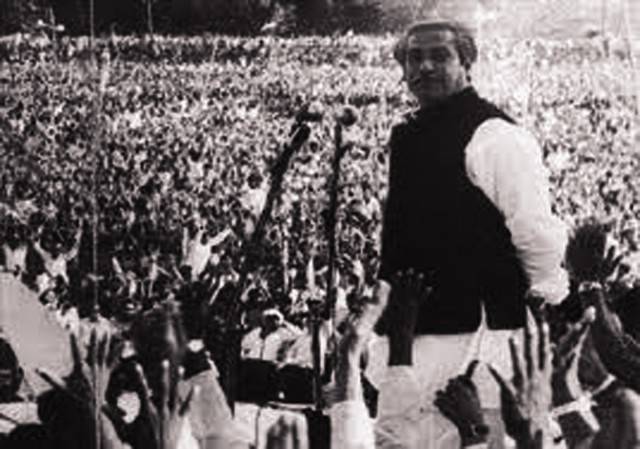
‘Yeh sun chuke hein zamane ke ahl-e-fikr-o-nazar
Keh maindakon ke ilekshan ki udd rahi hai khabar
Hua hai un pe Basic Democracy ka asar
Har aik kehta hai main hoon gavaah-e-Khwaja Khizr
Adaa-e-khaas se hai naaliyon mein tarraata
Bana hai shah ka masaahib phire hai itraata’
(It has been heard by the people of perception
That news is flying about of a frogs’ election
They have been affected by Basic Democracy
Everyone says that I am a witness for Khwaja Khizr’s advocacy
With his unique style he croaks in the drain(s)
He goes about being the king’s courtier, all vain)
Maindakon Ka Ilekshan (The Frogs’ Election, 1970) by Syed Mohammad Jafri
General elections were held in Pakistan on the 7th of December 1970 – 50 years ago this month - to elect members of the National Assembly. They were the first general elections since the independence of Pakistan and ultimately the only ones held prior to the independence of Bangladesh. Voting took place in 300 constituencies, of which 162 were in East Pakistan and 138 in West Pakistan.
The elections were a fierce contest between two social democratic parties, the west-based Pakistan Peoples Party (PPP) and the east-based Awami League. The Awami League was the sole major party in the east wing, while in the west wing of the country, the PPP faced severe competition from the conservative factions of the Muslim League, the largest of which was Muslim League (Qayyum), as well as Islamist parties like Jamaat-e-Islami (JI), Jamiat Ulema-e-Islam (JUI) and Jamiat Ulema-e-Pakistan (JUP).
The result was a victory for the Awami League, which won an absolute majority of 160 seats, all of which were in East Pakistan. The PPP won only 81 seats, all in West Pakistan. In the provincial elections held ten days later, the Awami League again dominated in East Pakistan, while the PPP were the winning party in Punjab and Sindh. The Marxist National Awami Party emerged victorious in the then Northwest Frontier Province (today KP) and Balochistan.
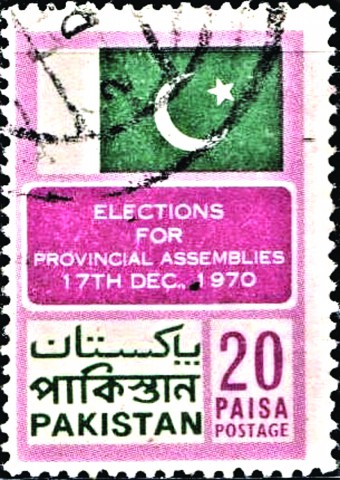
The National Assembly was initially not inaugurated as the military dictator Yahya Khan and the PPP chairman Zulfikar Ali Bhutto did not want a party from East Pakistan in the federal government. Instead, Yahya appointed the veteran Bengali politician Nurul Amin as Prime Minister, asking him to reach a compromise between the PPP and Awami League. However, this move failed as the delay in inauguration had already caused significant unrest in East Pakistan. The situation escalated into a civil war that led to the breakup of Pakistan and the formation of the independent state of Bangladesh.
The Assembly was eventually inaugurated in 1972 after Yahya resigned and handed power to Zulfikar Ali Bhutto. And so, eventually Bhutto became Prime Minister in 1973 after the post was recreated by a new constitution.
The 7th of December was thus a much-awaited date which arrived with a lot of desires around it. And it went well enough, scattering the flowers of joy. What a great and historic day it was, after all: tens of millions of the inhabitants of this land used their right of vote and the idea of “the sovereignty of the people” was imbued with meaning for the first time in Pakistan’s post-independence history. The caravan of the country seemed like it was finally moving towards the desired destination. Many had complained about the tyranny of the apprehensive captains who kept the nation deprived of its birthright for 23 years and because of whom the ship of the country fell repeatedly into a calamitous vortex and repeatedly crashed against the rocks of selfishness. Nations which had set foot in the field of independence after us reached new heights within this period; but we could not even determine the direction of our journey in the interim. The new generation would never have forgiven us this crime of ours.
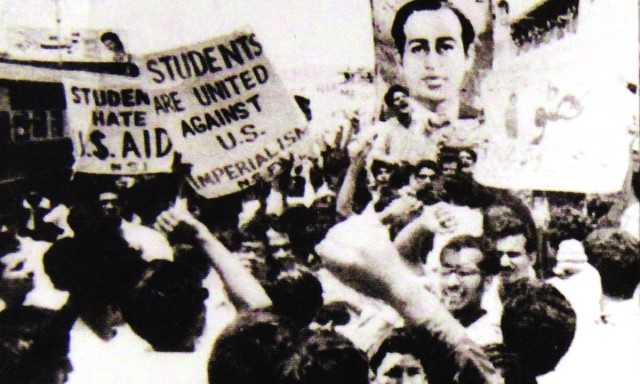
The consciousness and awareness of which the people gave evidence on the day of the National Assembly elections and the enthusiasm and spirit with which they arrived in the practical field for the expression of truth was a golden chapter in the history of our democratic struggle. Until just a few years ago, a military dictator used to say clearly that democracy was “not suited to the genius of Pakistanis.” So much so that the experiences of December 7 clarified that democracy was in the composition of Pakistanis and was their natural disposition – which had not really had the opportunity to display its qualities.
So the verdict of the people appeared as writing on the wall. And it also became abundantly clear that people had the full capability to distinguish between good and bad. Their verdict proclaimed that they had grown weary of the then-prevalent political and social system in the country and wanted to change it as soon as possible. They were with every such motto and party which was desirous of social revolution.
What tactic wasn’t used by the double-dealers during the period of election activities! Sometimes there was an uproar that Islam was in danger, so “O diehards! Rise up and sacrifice everything for the protection of Islam.” Sometimes the noise rose that the ideology of Pakistan was in danger, “so rise up and slay the enemies of the country.”
Fatwas of apostasy and heresy were issued upon socialism and its supporters and the election of the National Assembly was presented as a war between Islam and evil. Extremely provocative things were said about the left-wing parties in newspapers, the sermons of mosques, venues, even in the speeches on radio and television. Islamist groups were heavily promoted by the regime.
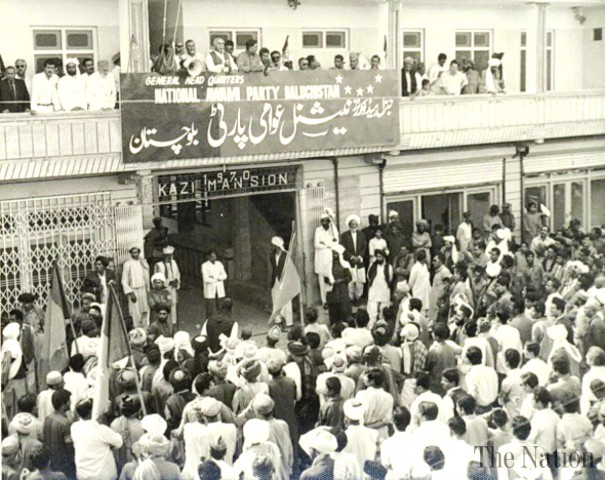
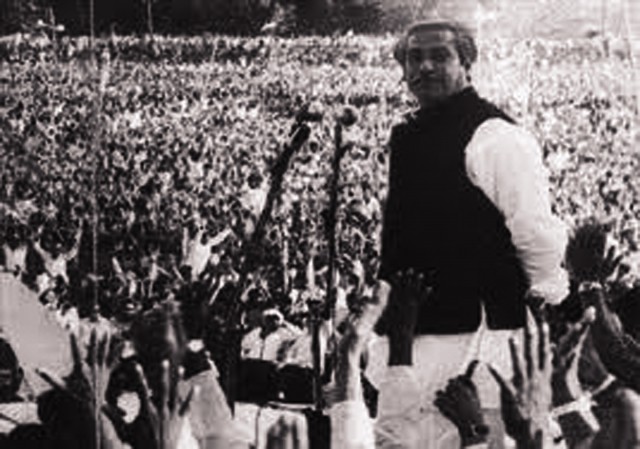
But this storm of propaganda could not influence the people. They were not deceived by the state-backed Islamists – and why would they, when their daily experiences had made them aware that the demon of capitalism had worn the clothing of religion. They tore this clothing to bits and the grotesque face of fundamentalists began to be visible to all.
The election of the National Assembly was not a war of evil and Islam but a historic contest between two opposite sets of social values and ideologies. On one side were the forces of social justice, democracy and equality, on the other the forces of loot and plunder, social exploitation and inequality. On one side were wealth and authority, abundance of capital and limitless resources. On the other were the burning faith and passion – the belief of the empty-pocketed and straitened people.
No force in the world can combat such unlimited power of the people. The verdict of history was before us all to see in 1970.
(to be continued)
All the translations from the Urdu are by the author. Raza Naeem is a Pakistani social scientist, book critic and award-winning translator and dramatic reader, currently based in Lahore, where he is also the president of the Progressive Writers Association. He can be reached at razanaeem@hotmail.com
Keh maindakon ke ilekshan ki udd rahi hai khabar
Hua hai un pe Basic Democracy ka asar
Har aik kehta hai main hoon gavaah-e-Khwaja Khizr
Adaa-e-khaas se hai naaliyon mein tarraata
Bana hai shah ka masaahib phire hai itraata’
(It has been heard by the people of perception
That news is flying about of a frogs’ election
They have been affected by Basic Democracy
Everyone says that I am a witness for Khwaja Khizr’s advocacy
With his unique style he croaks in the drain(s)
He goes about being the king’s courtier, all vain)
Maindakon Ka Ilekshan (The Frogs’ Election, 1970) by Syed Mohammad Jafri
General elections were held in Pakistan on the 7th of December 1970 – 50 years ago this month - to elect members of the National Assembly. They were the first general elections since the independence of Pakistan and ultimately the only ones held prior to the independence of Bangladesh. Voting took place in 300 constituencies, of which 162 were in East Pakistan and 138 in West Pakistan.
The elections were a fierce contest between two social democratic parties, the west-based Pakistan Peoples Party (PPP) and the east-based Awami League. The Awami League was the sole major party in the east wing, while in the west wing of the country, the PPP faced severe competition from the conservative factions of the Muslim League, the largest of which was Muslim League (Qayyum), as well as Islamist parties like Jamaat-e-Islami (JI), Jamiat Ulema-e-Islam (JUI) and Jamiat Ulema-e-Pakistan (JUP).
The result was a victory for the Awami League, which won an absolute majority of 160 seats, all of which were in East Pakistan. The PPP won only 81 seats, all in West Pakistan. In the provincial elections held ten days later, the Awami League again dominated in East Pakistan, while the PPP were the winning party in Punjab and Sindh. The Marxist National Awami Party emerged victorious in the then Northwest Frontier Province (today KP) and Balochistan.

The National Assembly was initially not inaugurated as the military dictator Yahya Khan and the PPP chairman Zulfikar Ali Bhutto did not want a party from East Pakistan in the federal government. Instead, Yahya appointed the veteran Bengali politician Nurul Amin as Prime Minister, asking him to reach a compromise between the PPP and Awami League. However, this move failed as the delay in inauguration had already caused significant unrest in East Pakistan. The situation escalated into a civil war that led to the breakup of Pakistan and the formation of the independent state of Bangladesh.
The elections were a fierce contest between two social democratic parties, the west-based Pakistan Peoples Party (PPP) and the east-based Awami League
The Assembly was eventually inaugurated in 1972 after Yahya resigned and handed power to Zulfikar Ali Bhutto. And so, eventually Bhutto became Prime Minister in 1973 after the post was recreated by a new constitution.
The 7th of December was thus a much-awaited date which arrived with a lot of desires around it. And it went well enough, scattering the flowers of joy. What a great and historic day it was, after all: tens of millions of the inhabitants of this land used their right of vote and the idea of “the sovereignty of the people” was imbued with meaning for the first time in Pakistan’s post-independence history. The caravan of the country seemed like it was finally moving towards the desired destination. Many had complained about the tyranny of the apprehensive captains who kept the nation deprived of its birthright for 23 years and because of whom the ship of the country fell repeatedly into a calamitous vortex and repeatedly crashed against the rocks of selfishness. Nations which had set foot in the field of independence after us reached new heights within this period; but we could not even determine the direction of our journey in the interim. The new generation would never have forgiven us this crime of ours.

The consciousness and awareness of which the people gave evidence on the day of the National Assembly elections and the enthusiasm and spirit with which they arrived in the practical field for the expression of truth was a golden chapter in the history of our democratic struggle. Until just a few years ago, a military dictator used to say clearly that democracy was “not suited to the genius of Pakistanis.” So much so that the experiences of December 7 clarified that democracy was in the composition of Pakistanis and was their natural disposition – which had not really had the opportunity to display its qualities.
So the verdict of the people appeared as writing on the wall. And it also became abundantly clear that people had the full capability to distinguish between good and bad. Their verdict proclaimed that they had grown weary of the then-prevalent political and social system in the country and wanted to change it as soon as possible. They were with every such motto and party which was desirous of social revolution.
Fatwas of apostasy and heresy were issued upon socialism and its supporters and the election of the National Assembly was presented as a war between Islam and evil. Extremely provocative things were said about the left-wing parties in newspapers, the sermons of mosques, venues, even in the speeches on radio and television
What tactic wasn’t used by the double-dealers during the period of election activities! Sometimes there was an uproar that Islam was in danger, so “O diehards! Rise up and sacrifice everything for the protection of Islam.” Sometimes the noise rose that the ideology of Pakistan was in danger, “so rise up and slay the enemies of the country.”
Fatwas of apostasy and heresy were issued upon socialism and its supporters and the election of the National Assembly was presented as a war between Islam and evil. Extremely provocative things were said about the left-wing parties in newspapers, the sermons of mosques, venues, even in the speeches on radio and television. Islamist groups were heavily promoted by the regime.


But this storm of propaganda could not influence the people. They were not deceived by the state-backed Islamists – and why would they, when their daily experiences had made them aware that the demon of capitalism had worn the clothing of religion. They tore this clothing to bits and the grotesque face of fundamentalists began to be visible to all.
The election of the National Assembly was not a war of evil and Islam but a historic contest between two opposite sets of social values and ideologies. On one side were the forces of social justice, democracy and equality, on the other the forces of loot and plunder, social exploitation and inequality. On one side were wealth and authority, abundance of capital and limitless resources. On the other were the burning faith and passion – the belief of the empty-pocketed and straitened people.
No force in the world can combat such unlimited power of the people. The verdict of history was before us all to see in 1970.
(to be continued)
All the translations from the Urdu are by the author. Raza Naeem is a Pakistani social scientist, book critic and award-winning translator and dramatic reader, currently based in Lahore, where he is also the president of the Progressive Writers Association. He can be reached at razanaeem@hotmail.com

